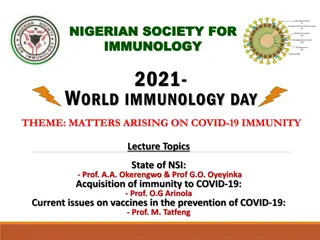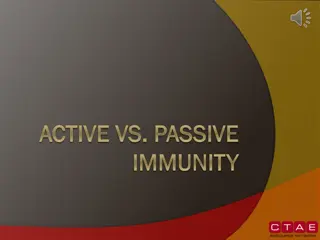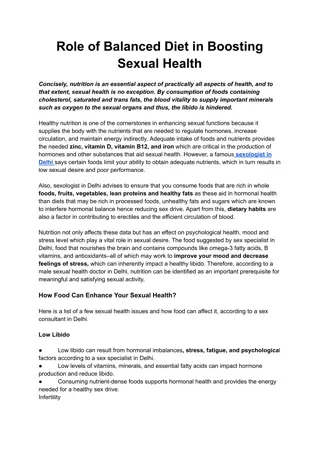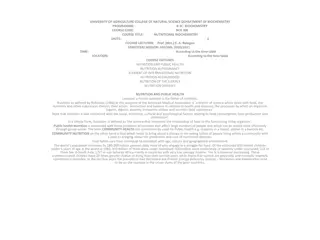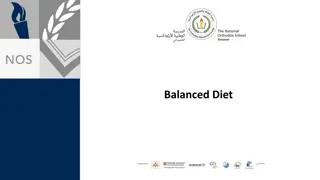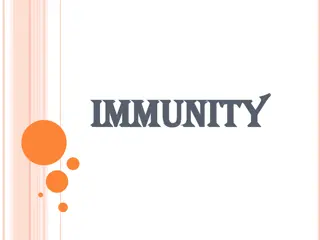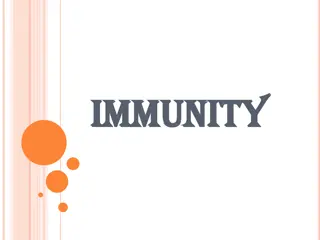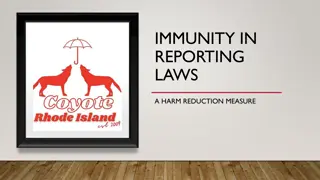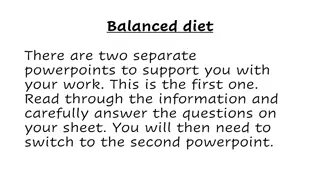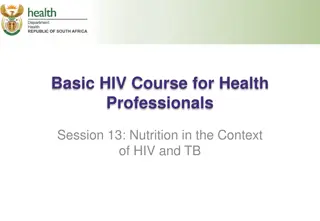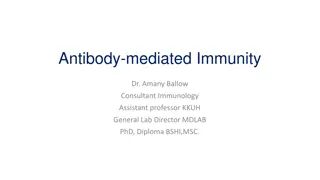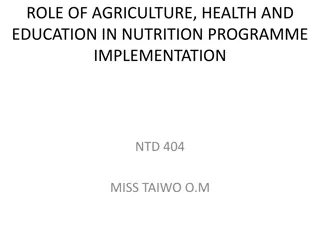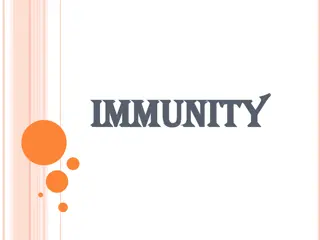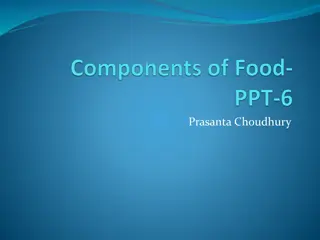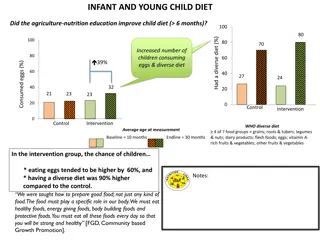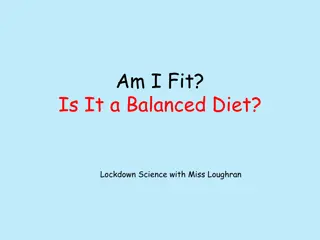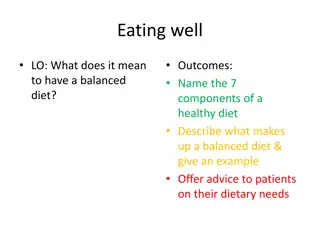Importance of Nutrition and Balanced Diet for Health and Immunity
Leading a healthy lifestyle is crucial for improving immunity, which involves maintaining a balanced diet, getting enough sleep, regular exercise, personal and environmental hygiene, and staying optimistic. A balanced diet includes a variety of foods to ensure sufficient nutrients for a strong body and mind. Proper nutrition is essential for overall health, development, and immune system strength, leading to fewer illnesses and better quality of life. Understanding the relationship among food, nutrients, and nutrition is key to making informed dietary choices.
Download Presentation

Please find below an Image/Link to download the presentation.
The content on the website is provided AS IS for your information and personal use only. It may not be sold, licensed, or shared on other websites without obtaining consent from the author. Download presentation by click this link. If you encounter any issues during the download, it is possible that the publisher has removed the file from their server.
E N D
Presentation Transcript
Leading a Healthy Lifestyle Leading a Healthy Lifestyle to Improve Immunity to Improve Immunity Technology and Living (Junior Secondary)
Healthy Lifestyle Healthy Lifestyle Balanced Diet Enough Sleep Regular Exercise Personal and Environmental Hygiene Optimistic and Positive 2
Balanced Diet Balanced Diet 3
Balanced Diet Balanced Diet Taking a variety of foods with adequate amounts contributes to good health Use the Healthy Eating Food Pyramid as planning meals For details, please refer to the website of the Department of Health Healthy Eating (https://www.change4health.g ov.hk/en/healthy_diet/guidelin es/index.html) a guide for Source: https://www.change4health.gov.hk/en/healthy_diet/guidelines /food_pyramid/index.html
Importance of a balanced diet Different food groups serve different purposes in meeting our nutritional needs. We have to vary our food choices every day to get sufficient nutrients for maintaining a balanced diet to help keep the body and mind strong and healthy. Each food group provide a specific set of nutrients. List of food groups: Grains & Cereals Fruits Vegetables Meat, Poultry, Fish, Eggs & Beans Milk & Dairy Products Sweets & Oils Fluids 5
The importance of nutrition Nutrition is an input to and foundation for health and development. Interaction of infection and malnutrition is well- documented. Better nutrition means stronger immune systems, less illness and better health. Healthy children learn better. Healthy people are stronger, are more productive and more able to create opportunities to gradually break the cycles of both poverty and hunger in a sustainable way. Better nutrition is a prime entry point to ending poverty and a milestone to achieving better quality of life. - WHO, 2020 Source: https://www.who.int/nutrition/nhd/en/ 6
Relationship among food, nutrients & nutrition What we choose to eat and drink influences our health, well-being and quality of life. Nutrition Digestion Nutrient Food Health 7
Nutrients Nutrients are the key players in nutrition, they are the substances that enrich the body and are essential to an organism (human). If it cannot be synthesised by the organism in sufficient quantities, it must be obtained from an external source (food). Nutrients can be divided into two main groups: 1.Macronutrient Macro means large Body needs more of them for energy and growth, including carbohydrates, fats and protein 2.Micronutrient Micro means small Nutrients required in only small amounts, including vitamins and minerals 8
Basic nutrition principles Nutrients Macronutrients Micronutrients carbohydrates Vitamins Foods Protein Minerals Fats Trace elements Balanced diet Energy Water Dietary fibre 9
Meal planning A well-planned diet delivers adequately a balanced array of nutrients and an appropriate amount of energy Choose more nutrient-dense foods with variety when planning meals 10
Enough Sleep Enough Sleep 11
Enough Sleep Enough Sleep Sleep is vital for health While sleeping, our muscles get relaxed and body tissues are repaired After a good sleep, we wake up feeling lively, clear-headed and full of energy Both sleeping time and sleeping quality are important 12
Regular Exercise Regular Exercise 13
Regular Exercise Regular Exercise Physical activity in daily life Studies show that regular physical activity (PA) can give us tremendous health benefits. Normally, the term physical activity is interpreted as sports being done in a full set of sport gear, like running or playing basketball. However, PA is not limited to those activities. In fact, any movement that exerts energy expenditure is regarded as physical activity. Therefore, a simple and sustainable way to increase your daily PA level is to make PA a regular habit in your life, enjoy the fun of PA and experience its benefits to health. For more details, please refer to the website of the Centre for Health Protection: https://www.chp.gov.hk/en/static/90003.html 14
Regular Exercise Regular Exercise Children and youth (aged 5 17 years) For children and youth of this age group, physical activity includes play, games, sports, transportation (e.g. walking or cycling), recreation, physical education or planned exercise, in the context of family, school, and community activities. For all healthy children and youth aged 5-17 years without any contraindication to physical activity, they should accumulate at least 60 minutes of moderate to vigorous-intensity physical activity every day. Performing more than 60 minutes of physical activity daily provides additional health benefits. Most of the daily physical activity should be aerobic. The activity plan should incorporate vigorous-intensity activity, including muscle-strengthening and bone-strengthening activity, at least 3 times per week. For details, please refer to the website of the Department of Health Physical Activity https://www.change4health.gov.hk/en/physical_activity/guidelines/youth/i ndex.html 15
Personal and Personal and Environmental Hygiene Environmental Hygiene 16
Personal and Environmental Personal and Environmental Hygiene Hygiene A good standard of personal cleanliness and have a sense of social morality could keep us from infection Stay healthy - look after our body, including keeping hair and hands clean etc. Keep our clothing clean - wash or remove any dirt from the clothes after wearing them, remove any stain from clothes as soon as possible, keep shoes clean etc. 17
Personal and Personal and Environmental Environmental Hygiene Hygiene Maintain a healthy living environment. Keep it well-ventilated, clean and free from pollution For details, please refer to the website of the Centre of Health Protection: https://www.chp.gov.hk/e n/healthtopics/content/4 60/19899.html Source: https://www.chp.gov.hk/files/pdf/pneumonia_respiratory_health_a dvice_en.pdf
Personal hygiene Personal hygiene What should we do before handling food? Hair: should wear a clean cap or hairnet and tie up the hair Clothing: put on apron before starting to prepare food Cuts: Fingernails: always keep them short and clean should cover any cuts with clean waterproof plasters 19
Personal hygiene Personal hygiene Should wash hands thoroughly in clean/warm water with detergent before preparing food and after touching raw meats Should wash hands after visiting toilet, blowing nose and handling refuse Avoid touching cooked food with bare hands Should use a clean spoon when tasting food during preparation and cooking, and wash it immediately afterwards Do not sneeze or cough over food Do not prepare food when suffering from flu, diarrhoea, colds, coughs or other infections 20
Personal hygiene Personal hygiene Wash hands before handling food and between handling different types of food Watch the video: How to wash hands properly (Centre for Health Protection) https://www.youtube.com/ watch?v=_3rYoh4gXV0&fea ture=youtu.be Source: https://www.chp.gov.hk/en/resources/e_health_topics/2867.html
Optimistic and Positive Optimistic and Positive 22
Optimistic and Positive Optimistic and Positive Laughing immune cells in the blood and relieves fatigue More positive thinking, respect others, willing to share and caring for others needs can divert attention and reduce stress increases the number of antibody 23




![READ [PDF] Dash diet Cookbook for beginners: 365 days of simple, healthy, low-s](/thumb/2057/read-pdf-dash-diet-cookbook-for-beginners-365-days-of-simple-healthy-low-s.jpg)
